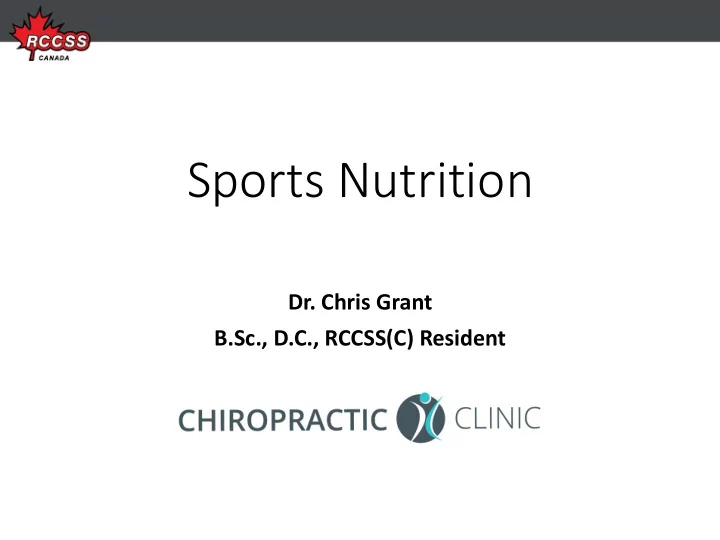

Sports Nutrition Dr. Chris Grant B.Sc., D.C., RCCSS(C) Resident
Reputable Resources • Journal of the International Society of Sport Nutrition (JISSN) • Yann Le Meur • Senior editor of the British Journal of Sports Medicine • YLMSportScience • Asker Jeukendrup • Mysportscience.com 2
Questions, Concerns & Interests 3
Canada’s Food Guide Limit foods high in sodium, sugars or saturated fats 4
What is the right diet for you? 5
Caloric Deficit 6
There is a difference between eating for performance & weight loss 7
Creating an Adaptation 8
Sports Nutrition Pyramid • Supplements Daily • Carbohydrates • Protein Nutrition • Water 9
Carbohydrates 10 Thomas 2016
Substrate Utilization 11
Carbohydrates • Monosaccharides • Glucose, fructose • Disaccharides • Sucrose, lactose • Oligosaccharides • Maltodextrin • Polysaccharides • Amylopection, glycogen 12
Glycogen Stores • Muscle Glycogen • 400g • Liver Glycogen • 90-110g • Blood Glucose • 2-3g 13
Gastric Emptying • ↑ exercise intensity = ↓ gastric emptying • ↑ carbohydrate = ↓ gastric emptying 14
Carbohydrate Supplements 15
Depending on Race Duration 16 Jeukendrup 2014
Questions??? 17
Post-Training Fueling • Carbohydrates • Protein 18
Glycogen does not replenish rapidly to pre-exercise levels! It takes at least 24 hours to replenish muscle glycogen. • Rapid Phase • 30-60 minutes post-exercise • Not insulin dependent • Slow Phase • Insulin dependent 19
Post-Exercise Protein Consumption • Post-exercise ingestion of protein stimulates muscle protein synthesis (aka. building muscle) • This appears to be less important in people who consume 20-40g of protein every 3-4 hours • The general approach • Consume a post-exercise protein source 20 Kerksick 2017
Carbohydrate Loading 21
22 Burke 2016
23
Protein • RDA = 0.8 g/kg/d • Athletes = 1.4-2.0 g/kg/d • 20-40 g/intake • Ingest every 3-4 hours • Leucine 24 Jager 2017
How Much Protein? • 80kg male • 0.8g/kg/day • 64g/day • 2.0g/kg/day • 160g/day 25
26 Naughton 2016
27
28
Supplementation 29
30 Maughan 2018
31
Caffeine • Mechanism • ↑ endorphin release • ↑ neuromuscular function • ↑ alertness • ↓ RPE during exercise 32 Peeling 2018
Caffeine • Improved performance in endurance and high- intensity exercise • 3-6mg/kg, consumed 60 minutes before competition • 240-480mg of caffeine • 2-5 cups of coffee • 1-2 caffeine pills 33 Peeling 2018
34 Beaumont 2016
Creatine • Safe & effective • Naturally occurring • Phospho-creatine pathway • Supplementing increases creatine stores by 30% 35 Peeling 2018
36
Beta-Alanine 37 Maughan 2018
Sodium Bicarbonate 38 Peeling 2018
Nitrates • Proposed benefits • Enhanced efficiency of mitochondria • Enhanced function of fast-twitch muscle fibers • Increased blood flow to the muscle • Improvements • 1-3% in events < 40 minutes • 3-5% in high-intensity exercise; 12-40 minutes • High nitrate-containing foods • Spinach, arugula, celery, beetroot 39
Vitamin D • RDA = 600 IU/d • ↑ response to exercise • ↓ stress fractures • ↓ upper respiratory tract infections • Consult with a physician, dietician or nutritionist 40
Probiotics • Improvement in athletes prone to GI tract problems • Travelling to regions in which GI disturbances are more likely • Supplementation needs to begin well ahead of competition 41
42
Questions About Supplements 43
Vegan Athletes • Energy/Calories • Protein • B12 • Iron • Zinc • Calcium • Iodine • Vitamin D • Omega-3 Fatty Acids 44
Energy • Vegans generally consume less energy than omnivores • Decreased protein intake • Decreased fat intake • Increased fiber intake 45
Protein • Athletes require more protein than the average person • Incomplete proteins • Contain less BCAAs 46
Omega-3 Fatty Acids • No marine-based fats • Vegan-Friendly Omega- 3 Sources • Flax seed • Increase nitric oxide • Walnuts production • Chia • Microalgae-oil supplement • Improve heart rate variability 47
Vitamin B12 • Absence of animal and dairy products • No other naturally-occurring, B-12 rich foods • B12 supplement or fortified foods (i.e. plant-based milks) 48
Iron • Vegans consume the • Vegan-Friendly Iron same amount of iron as Sources omnivores • Legumes • Grains • Nuts • Less bioavailability from • Seeds plant-based sources • Green vegetables • Female are susceptible to iron-deficiency anemia 49
Zinc • Zinc is widely available • Vegan-Friendly Sources in plant-based foods of Zinc • Beans • Nuts • Poor absorption into • Seeds the body • Oats • Wheat Germ • Nutritional Yeast • Low zinc availability is rarely a concern for vegans 50
Calcium • Vegans consume less • Vegan-Friendly Calcium calcium than vegetarians Sources and omnivores • Tofu (calcium set) • Fortified milks and juices • Kale • Increased risk of fracture • Broccoli • Sprouts • Cauliflower • Important during • Bok Choy childhood • Oxalate impede calcium absorption 51
Iodine • Vegans can have low • Vegan-Friendly Iodine iodine levels Sources • Seaweed • Cranberries • Vegans that eat a lot of • Potatoes seaweed can actually • Prunes be at an increased risk • Navy Beans of elevated iodine • Iodized Salt levels 52
Vitamin D • Exposure to the sun • Fortified-Food (i.e. milk) • Vitamin D3 (cholecalciferol) • Fungal-algae D3 53
Pam Rocca 54
Questions • Website: drchrisgrant.com • Instagram: @drchrisgrant • Facebook: Dr. Chris Grant 55
56
57
58
59
60
61
Carbohydrate Intake • General fueling (< 90 min. of exercise) • 7-12 g/kg/day • Carbohydrate Loading • 36-72 hours before • 10-12 g/kg/d • Speedy Refueling (< 8 hours between sessions) • 1-1.2 g/kg/h for the first 4 hours • Small, regular snacks • Pre-event fueling (> 60 minutes) • 1-4 g/kg consumed 1-4 hours before exercise • Avoid high fat, protein and fiber 62
Recommend
More recommend